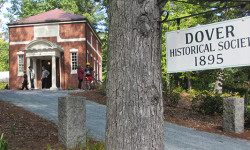By Audrey Anderson
Hometown Weekly Reporter
On March 26, over 100 people filled the Dover American Legion Hall to listen with great interest to the details of Dover resident Amelia Peabody’s life (1892-1984) and legacy in their beloved town and beyond.
The evening’s presenter, Judy Schulz began her lecture, “Amelia Peabody: Artist, Philanthropist, and Entrepreneur,” by describing Peabody’ early life in Marblehead, Massachusetts. In 1895, her family moved to 120 Commonwealth Avenue in Boston. Peabody attended the School of the Museum of Fine Arts, where she studied sculpture. She debuted in 1909 and soon became busy with school, riding, visiting, and evenings at the opera or at parties. Life became overwhelming, and she became a patient at the Devereux Mansion Sanatorium in Marblehead. The Sanatorium was led by a doctor who believed in combining arts, crafts, and medicine to heal people. Peabody helped other patients with creating art by hand as therapy. Peabody left Devereux in 1914 and began helping with art therapy in Boston hospitals.
Peabody purchased Mill Farm in Dover. She built a Bauhaus style studio nearby and focused on creating sculpture with an increasingly modern feel. Her “Bicycle Boy” was exhibited in 1939 at the Chicago World’s Fair.
Some of her other notable sculptures included “Hurricane,” in which she depicted a man and women in a tight embrace while a hurricane roared around them. Her “Boy and Cat” was a garden sculpture that won first prize at the Boston Art Festival. Her ceramic sculpture “Truck Driver” was exhibited at the International Ceramic Exhibition in 1957.
She continued to create contemporary sculptures throughout her life. Her 1962 piece “Fall Out” explores the threat of nuclear war. Her timely “Women’s Lib” (1975) which depicted an unencumbered man walking, lead and followed by women with large backpacks.
In 1944, Peabody served as the Chairman of the Arts and Skills Division at the Red Cross. She worked with returning soldiers, continuing with her art therapy work, which she believed gave the soldiers power, confidence and hope.
As a philanthropist in the Boston area, Peabody donated the East Wing of the Museum of Science, an organ for King’s Chapel, the Eaton Peabody Lab at Massachusetts Eye and Ear, the Amelia Peabody Pavilion at Tufts in Grafton, and she also designed medals for Joslin Diabetes Hospital patients, among many other major donations.
Peabody’s extraordinary life remains a fascinating story of a skilled, determined and intelligent women who led her life as she chose and had a great effect on the 20th century in Dover and in the world.
The Dover Historical Society will be holding an exhibition of Peabody’s sculpture and a walk at Powisset Farm in April and May. See https://doverhistoricalsociety.org/ for more details

























